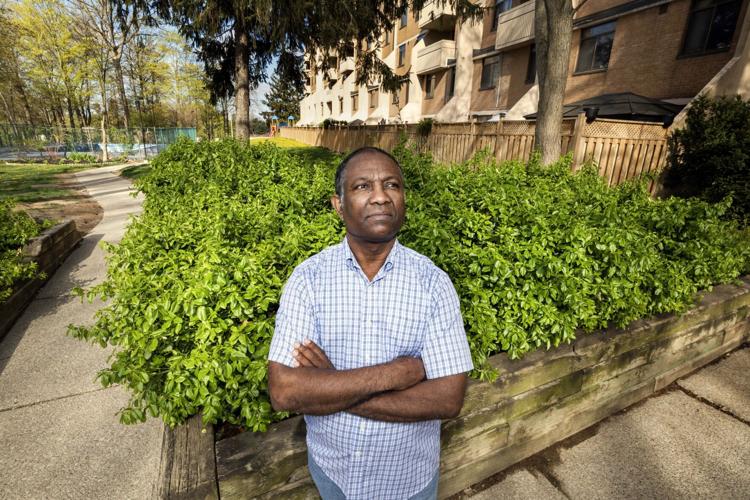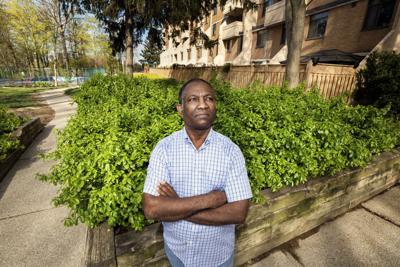Gabriel Allahdua slept on a bunk bed crammed in a room with eight men in a bleak southwestern Ontario bunkhouseĀ ā part of a farmās propertyĀ ā where 62 migrant farm workers shared just three stoves and four washers and dryers, with no internet.
The sewage system would frequently get backed up and cause flooding in the living room and kitchen, he recalled.
These were Allahduaās accommodations for four years as a seasonal migrant farm worker from St. Lucia, toiling several months a year on a Leamington farm. He worked up to 66 hours a week, sometimes 14-hour days, including Sundays, without overtime pay,Ā planting and harvesting vegetables.
The living conditions were āinhumane,ā said Allahdua, but speaking out was risky as he lived on property owned by his employers, with his status in Canada bound to their approval.
āThe employer is not just an employerĀ ā they are also your landlord and control your immigration status,ā he said. āWe were at their mercy.ā
A new guidance report calling for federally enforced national housing standards for migrant agricultural workers shows that this isnāt just Allahduaās storyĀ ā for decades it has been a well-documented reality for tens of thousands of migrant workers, essential to the countryās food supply,Ā who come here each year to work on farms and provide food for Canadians.
, employers are supposed to provide migrant farm workers with adequate, suitable and affordable housing, which can be either on-farm (for example, a bunkhouse) or offsite (for example, a commercial establishment).
However, the report, released Friday and authored by a group of 29 academics, advocates and clinicians, includes worker accounts of widespread, systemic housing abuse: Workers are frequently housed in overcrowded, unsafe conditionsĀ ā converted garages, sheds or containersĀ ā with several men to a room, enduring mould, rodents, broken heating and limited access to clean water. Employer control extends beyond work, with constant surveillance, restricted movement and retaliation against complaints, while inspections can be staged, allowing employers to temporarily fix violations and deter workers from reporting abuse.
The report highlights that without proper inspections, government oversight, privacy and protection from retaliation, workers will continue to live at the mercy of their employers.
A national standard for migrant worker housing has not yet been implemented ā despite a study commissioned by the federal government that found āgaps in the housing inspection processā and an āextremely wide variation of what is deemed an acceptable housing standard.ā
There is a ācollective sense of disappointmentā over the lack of progress on housing standards for migrant workers, especially since the COVID-19 pandemic exposed the dangers of inadequate accommodations linked to severe outbreaks and worker deaths, said Stephanie Mayell, a co-author of the report and PhD candidate in the Medical Anthropology Program at the University of Toronto.
āOur food system is always an important and essential concern,ā said Mayell. āAnd we don’t have a food system without migrant workers.ā
“”±ō³Ł³ó“Ē³Ü²µ³óĢżthe federal government conducts investigations of employersĀ using the temporary foreign worker program, employers are typically given notice before the inspection takes place.Ā
In January, the ESDC reported conducting 649 inspections between April and September last year, ā a small fraction of the roughly 20,000 employers approved to hire temporary foreign workers during that period.
Clifford Paul Mcleish, a migrant worker from Jamaica, said his accommodation hadnāt been inspected once in more than a decade of seasonal work on Ontario farms.
In one of his lodgings, Mcleish recalled, rats crawled around the floors and tables.
āThere was dirt everywhere, mud everywhere,ā he said. āOne night, I had to kill two rats in the same area where we cooked.ā

CI-TFW-HOUSING Clifford Paul Mcleish, a migrant worker from Jamaica, said his accommodation hadnāt been inspected once in more than a decade of seasonal work on Ontario farms. In one of his lodgings, he said rats crawled around the floors and tables. Uploaded by: Alsharif, Ghada
Alsharif, GhadaWhen he and other workers tried to speak up, their employer threatened to send them home.
āWe are human beings. We canāt live like this.ā
The report recommends that āinspections should be proactive, unannounced, and occur at regular intervals” during migrant agricultural workersā contracts.
These checks should occur every four months during workers’ stays, including during peak summer and winter seasons to ensure adequate heating or cooling systems are in place and workers should have a safe, confidential way to provide input on their housing without fear of retaliation, the report said.
Migrant farm workers can come for eight months a year; others have work permits for up to two years. But none can gain permanent residence through the countryās temporary foreign worker streams. Critics have long argued that without permanent status, workers lack equal rights and the freedom to leave abusive employers.
āThere needs to be an enforceable set of standards,ā Mayell said, āso that we can provide a group of essential workers, without whom we wouldn’t eat, the kind of dignified existence in Canada that many Canadians like to believe we do.ā
































To join the conversation set a first and last name in your user profile.
Sign in or register for free to join the Conversation